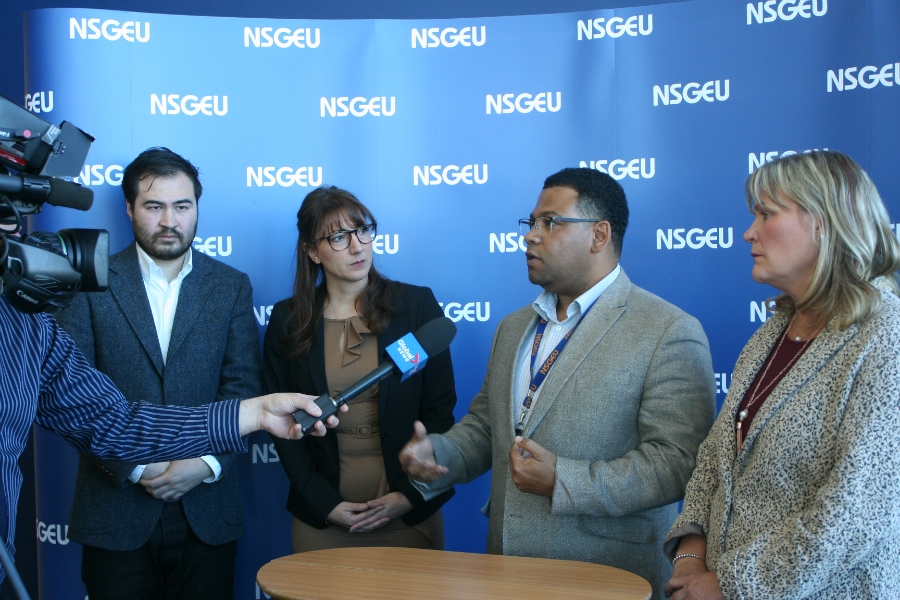KJIPUKTUK (Halifax) – A private for-profit blood supply system is not welcome in Nova Scotia, and the provincial government should enact legislation as soon as possible to ensure private companies such as Canadian Plasma Resources (CPR) do not get to set up shop here.
That was the main message at this morning’s press conference organized by unions, the Nova Scotia Health Coalition and Bloodwatch, an organization that advocates for a safe, voluntary, public blood system in Canada.

Many people expect CPR to soon go public with its intention to open storefronts in Nova Scotia, although until now the company has not confirmed this. In other provinces where CPR operates, such as Saskatchewan, CPR gravitates towards low income neighborhoods, with lots of payday loans and pawnshops in the area, one can only assume because poor people make desperate and therefore eager donors.
There is something just not right about people living in deep poverty selling their plasma, said Janet Hazelton, president of the Nova Scotia Nurses Union. “People selling their plasma so they can buy groceries, is that where we want to be as Nova Scotians,” she asked, “I don’t think so.”
There are safety issues as well with a private company paying plasma donors. In the eighties tainted blood infected 2,000 Canadians with HIV, and many thousand more, perhaps as many as 30,000, were infected with hepatitis C. An inquiry, led by Justice Horace Krever, looked at root causes and recommended that blood donations remain unpaid and voluntary.
Unpaid and voluntary is exactly the business model of the Canadian Blood Services (CBS), the not for profit organization that took over blood collection in Canada from the Canadian Red Cross. Plasma collection is part of its mandate.
The process of plasma donation is similar to that of donating blood, but the cells are returned to the donor during the process, and only the plasma is taken. The process takes longer, but people can give more frequently. The plasma is used as as a substitute for whole blood and for transfusion purposes.
Many people assume that plasma donated to companies such as CPR ends up helping Canadians in need of a transfusion, but that is not the case, said Hazelton. “CBS will not purchase blood and plasma from these private companies. The paid-for plasma will not be helping needy Canadians, it will end up being sold anywhere in the world.”
“We think it is really important to have a public blood system and to maintain its voluntary nature. We’re proud that if people give blood or plasma, they do so out of a desire to take care of their fellow Nova Scotians and Canadians,” said Chris Parsons, provincial coordinator for the Nova Scotia Health Coalition.
Paying for blood donations is illegal in Quebec, Ontario and Alberta. Speakers at this morning’s press conference want Nova Scotia to do the same.
“Allowing companies to turn it into a market relationship threatens the safety and integrity of the blood system and also the safety of those who would be contributing. We’re three years overdue in terms of a legislated ban, and we are asking the provincial government to act as soon as possible,” Parson said.
“We need that legislation to protect public blood in Canada. A ban on the private sale of plasma and blood in Canada is absolutely needed, so that justice Horace Krever’s recommendations are upheld,” said Jason MacLean, president of the Nova Scotia Government & General Employees union.
Allowing companies such as CPR to set up for business doesn’t provide any benefits to the province. All it does is open the door to a competitor to CBS vying for a finite number of blood donors, only to sell that plasma outside of Canada.
“There is nothing good to come out of a private plasma broker to set up in Nova Scotia. It does not serve patients, and it does not serve people who need plasma anywhere in Canada,” said Kat Lanteigne, executive director of Bloodwatch.
See also: Healthcare activists hold information picket on pay-for-plasma clinics
On Tuesday April 10, at 6:30 PM, you are invited to attend Ban Blood Money – Why we need to stop for-profit blood brokers in Nova Scotia. Art Bar + Projects, 1873 Granville Street, Halifax, NS
If you can, please support the Nova Scotia Advocate so that it can continue to cover issues such as poverty, racism, exclusion, workers’ rights and the environment in Nova Scotia. A paywall is not an option for us, since it would exclude many readers who don’t have any disposable income at all. We rely entirely on the kindness of occasional one-time donors and a small group of loyal monthly sustainers.



